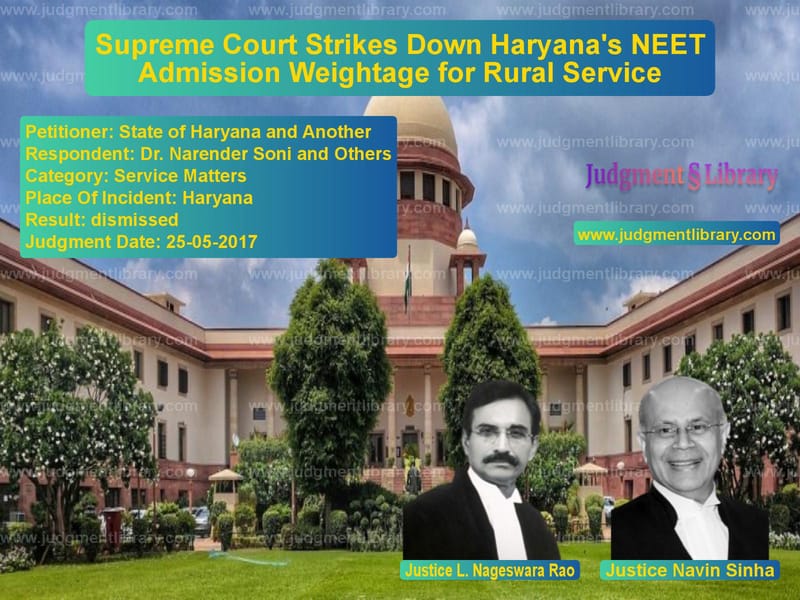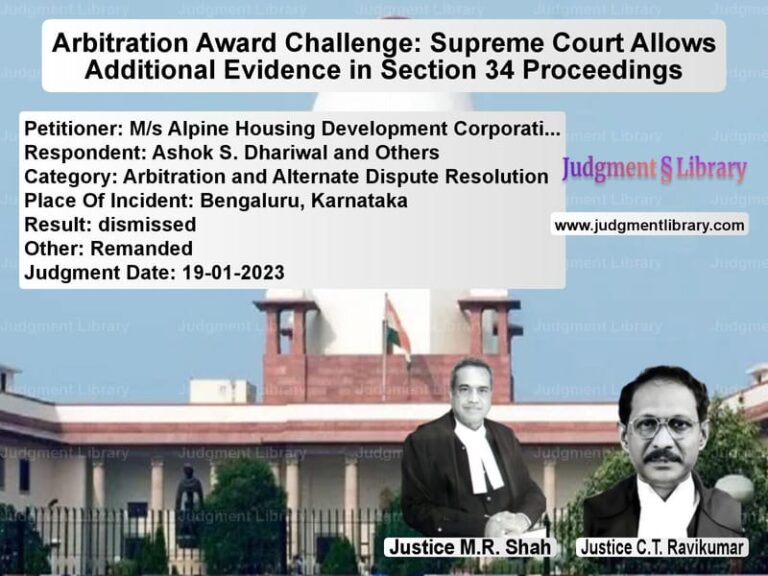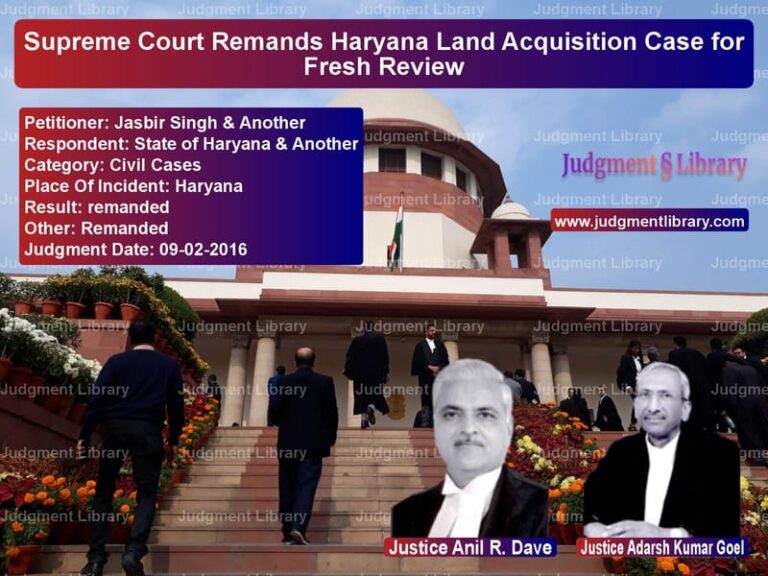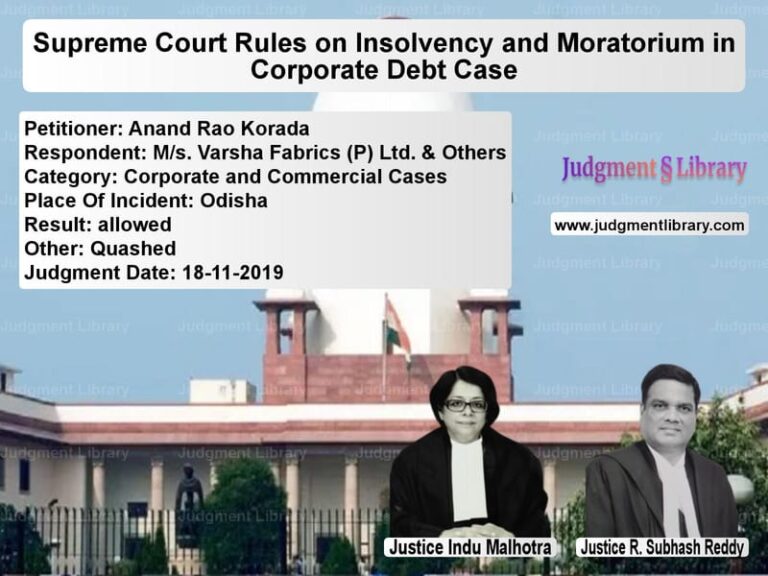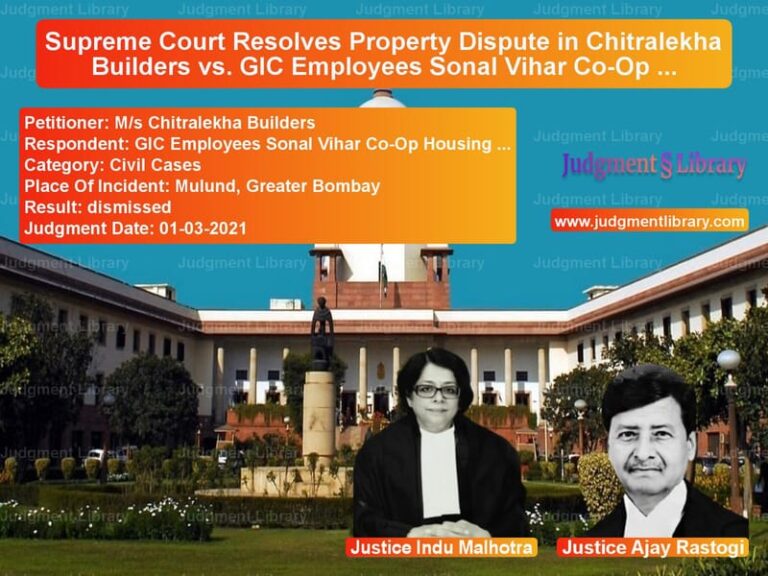Supreme Court Strikes Down Haryana’s NEET Admission Weightage for Rural Service
The Supreme Court of India, in its judgment dated May 25, 2017, in State of Haryana & Another vs. Dr. Narender Soni & Others, examined the legality of a notification issued by the State of Haryana granting weightage in the National Eligibility-cum-Entrance Test (NEET) for postgraduate medical and dental admissions. The notification, issued on May 5, 2017, sought to provide additional marks to candidates who had served in ‘remote’ and ‘difficult’ areas of the state. The Supreme Court struck down this notification, ruling that it was issued in undue haste and lacked a proper basis for identifying remote and difficult areas.
Background of the Case
The case arose when the Haryana government, citing the need to incentivize medical professionals to serve in underprivileged areas, issued a notification providing weightage to candidates for admissions to postgraduate medical courses. The notification, however, was challenged by affected candidates who alleged that it was arbitrary, lacked transparency, and was issued only after NEET results had been declared.
Legal Issues Addressed
The Supreme Court examined several critical questions:
- Whether the Haryana government’s identification of remote and difficult areas for NEET weightage was fair and justified.
- Whether the notification was issued with undue haste and without adequate groundwork.
- Whether the notification was applied retrospectively after NEET results were declared, thus affecting candidates’ rights.
Arguments by the Petitioners (State of Haryana)
- The State of Haryana argued that the notification aimed to address a pressing need for healthcare professionals in remote areas.
- The government relied on prior policies and statistics on healthcare vacancies to justify the designation of remote and difficult areas.
- The notification was defended as being in consonance with the Supreme Court ruling in State of U.P. vs. Dinesh Singh Chauhan, which endorsed incentivizing rural service.
Arguments by the Respondents
- The respondents contended that the notification was issued arbitrarily, with the identification of remote areas being done without proper data.
- They argued that the notification was made effective after NEET results were announced, violating candidates’ rights by changing admission criteria mid-process.
- The respondents highlighted that the identification of remote areas was flawed, with some locations classified as remote despite being near urban centers.
Supreme Court’s Observations
The Supreme Court examined the criteria used by the Haryana government and found them inadequate. The Court ruled that:
- The notification was issued in ‘hot haste’ without proper analysis, as it was finalized within a day of forming a committee.
- The identification of remote areas was arbitrary and lacked correlation with actual healthcare access issues.
- The notification was implemented even before its publication in the official gazette, raising questions about due process.
- The identification of remote areas was done solely for the purpose of NEET admissions, rather than being part of a broader healthcare policy.
Final Judgment
The Supreme Court struck down the notification, ruling:
“The notification was issued without adequate groundwork, in an arbitrary manner, and was implemented before it was even published in the gazette, rendering it legally unsustainable.”
The Court extended the last date for admission to June 10, 2017, to allow the Haryana government to issue a fresh notification if it wished, provided it adhered to proper legal procedures.
Implications of the Judgment
This ruling sets a strong precedent regarding government notifications affecting medical admissions:
- Ensuring Transparency: State policies affecting competitive exams must be issued transparently and well in advance.
- Protection Against Arbitrary Policy Changes: The ruling prevents retrospective changes to admission criteria, protecting students’ rights.
- Fair Implementation of Incentives: Incentives for rural service must be based on proper data and should not be implemented solely for admissions.
Conclusion
The Supreme Court’s ruling in State of Haryana vs. Dr. Narender Soni is a significant decision in the field of education and public administration. By striking down the flawed notification, the Court has reinforced the importance of fair and transparent policymaking in medical admissions. The case highlights the judiciary’s role in ensuring that state policies adhere to constitutional principles and do not unfairly disadvantage candidates.
Don’t miss out on the full details! Download the complete judgment in PDF format below and gain valuable insights instantly!
Download Judgment: State of Haryana and vs Dr. Narender Soni an Supreme Court of India Judgment Dated 25-05-2017.pdf
Direct Downlaod Judgment: Direct downlaod this Judgment
See all petitions in Recruitment Policies
See all petitions in Public Sector Employees
See all petitions in Promotion Cases
See all petitions in Judgment by L. Nageswara Rao
See all petitions in Judgment by Navin Sinha
See all petitions in dismissed
See all petitions in supreme court of India judgments May 2017
See all petitions in 2017 judgments
See all posts in Service Matters Category
See all allowed petitions in Service Matters Category
See all Dismissed petitions in Service Matters Category
See all partially allowed petitions in Service Matters Category

